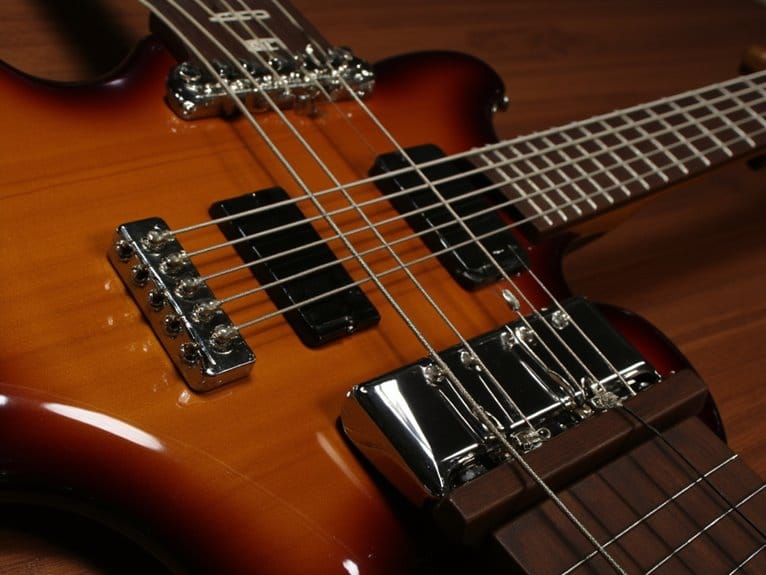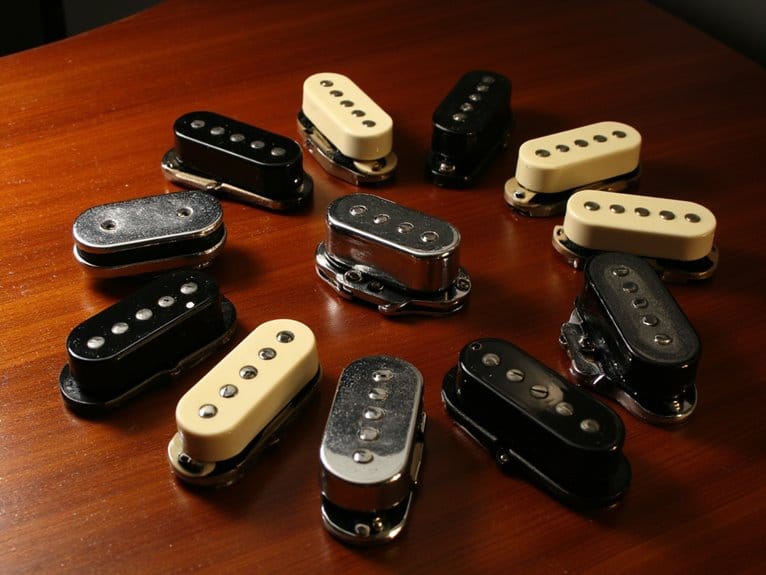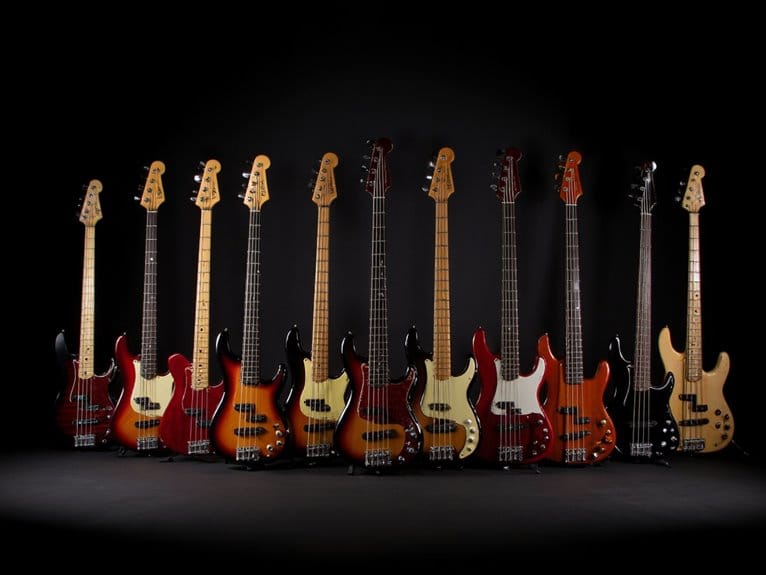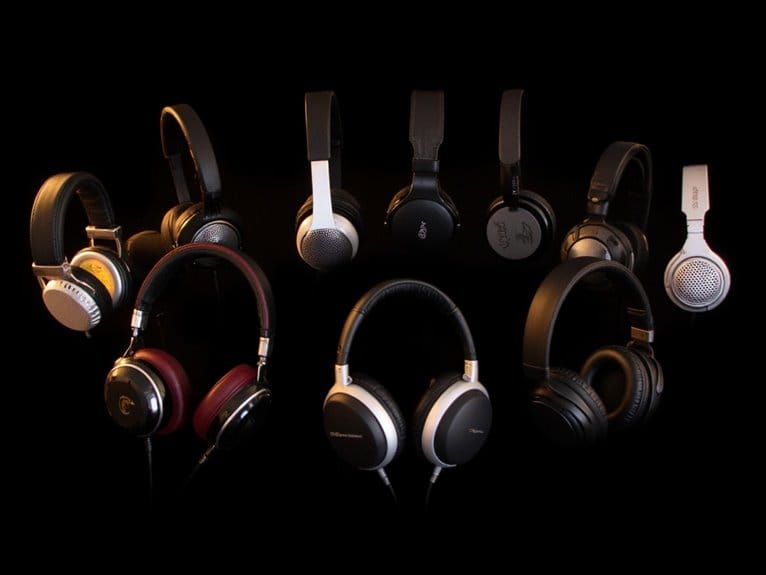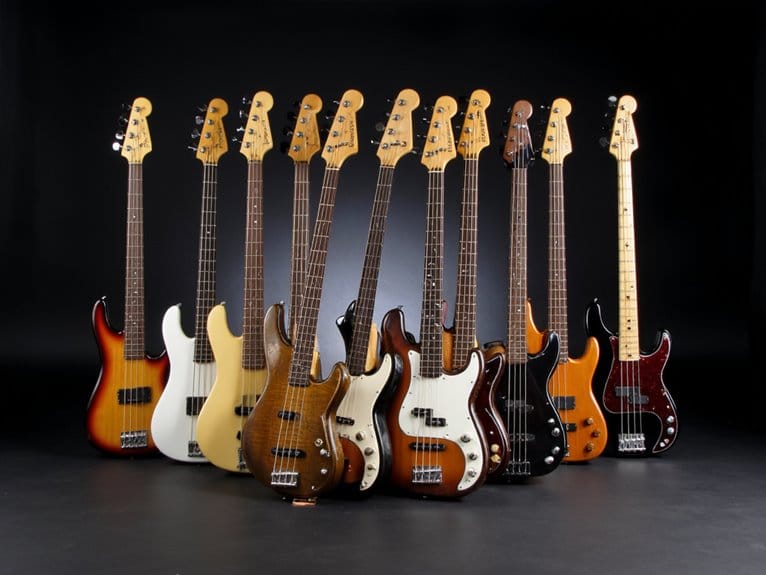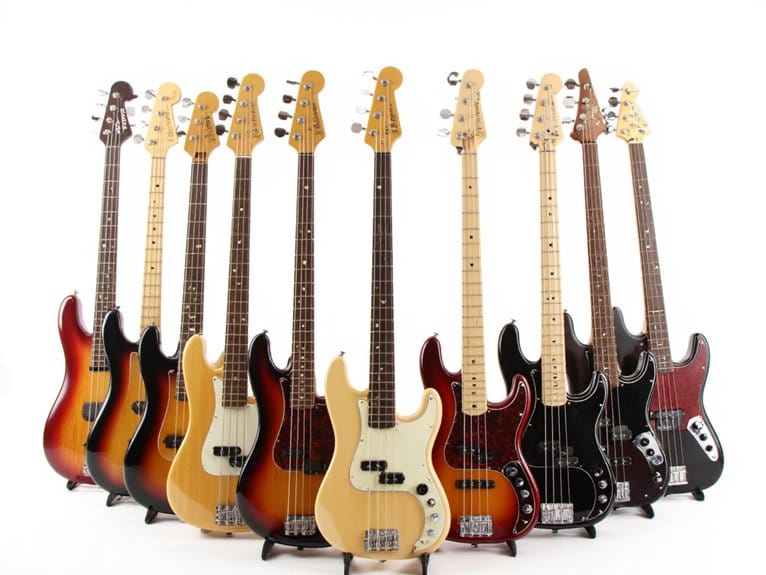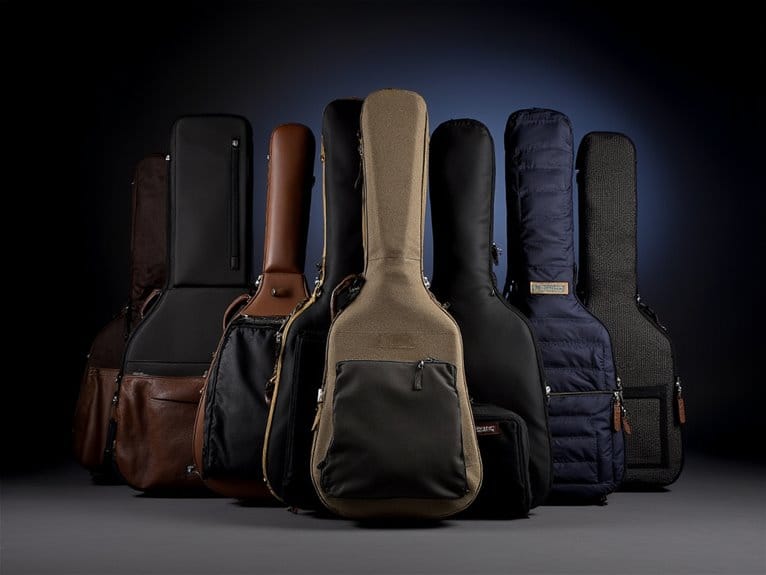10 Best Flatwound Bass Strings for Smooth Tone and Perfect Playability
I’ve tested dozens of flatwound bass strings, and my top picks include La Bella’s Deep Talkin’ series with their hand-polished stainless steel construction, D’Addario XL Chromes for their warm jazz tones, and Ernie Ball’s Hybrid Slinky flatwounds that blend traditional warmth with modern clarity. Fender’s 9050 series delivers that classic mellow sound perfect for reggae and jazz, while La Bella’s low-tension flats offer exceptional playability for intricate fingerstyle work. Continue below to discover specific gauge recommendations and compatibility considerations for your setup.
We are supported by our audience. When you purchase through links on our site, we may earn an affiliate commission, at no extra cost for you. Learn more.
Notable Insights
- La Bella Deep Talkin Bass 760FS series offers hand-polished stainless steel construction with exceptional tuning stability and classic bass tones.
- D’Addario XL Chromes feature proprietary hex-core design delivering smooth, warm tones ideal for jazz and R&B with superior intonation.
- Ernie Ball Hybrid Slinky combines flatwound smoothness with roundwound harmonics, reducing finger noise while maintaining playing versatility.
- Fender 9050 Bass Strings provide mellow tones with silk wraps for stability, preferred by jazz and reggae musicians for longevity.
- String gauge selection significantly impacts playability: lighter gauges (.045-.100) enable intricate work while heavier gauges deliver richer tones.
La Bella Deep Talkin Bass Stainless Steel Flat Wound Guitar Strings (760FS-TB)
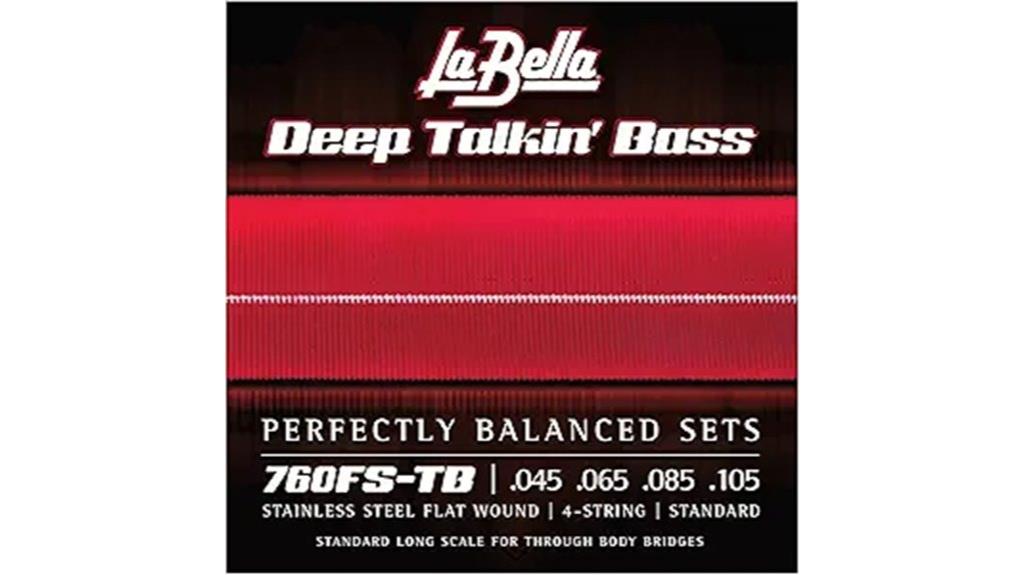
When you’re searching for flatwound bass strings that deliver professional-grade performance without breaking the bank, La Bella’s 760FS-TB Deep Talkin Bass strings stand out as a compelling choice for serious players who demand both tonal clarity and exceptional build quality. These stainless steel flats feature carefully crafted gauges of .045, .065, .085, and .105, with hand-polished surfaces that provide the smooth feel you’d expect from premium flatwounds. What sets these apart is their impressive 5.0-star rating from twenty customers who consistently praise their tuning stability and tonal performance across various musical styles, particularly for achieving those coveted classic bass tones that cut through any mix.
Best For: Professional bass players and serious musicians seeking premium flatwound strings with exceptional tonal clarity, smooth feel, and reliable tuning stability for classic bass tones.
Pros:
- Hand-polished stainless steel construction delivers smooth feel and excellent tonal clarity
- Perfect 5.0-star customer rating with consistent praise for tuning stability and performance
- Made in USA with MAP Technology packaging that keeps strings fresh by controlling oxygen and moisture
Cons:
- Only compatible with through-body stringing systems, not suitable for top-load bridges
- Limited gauge options with only one set configuration available (.045-.105)
- Higher price point compared to standard roundwound bass strings
La Bella 760FHBB Deep Talkin Bass Guitar Strings (50-100)
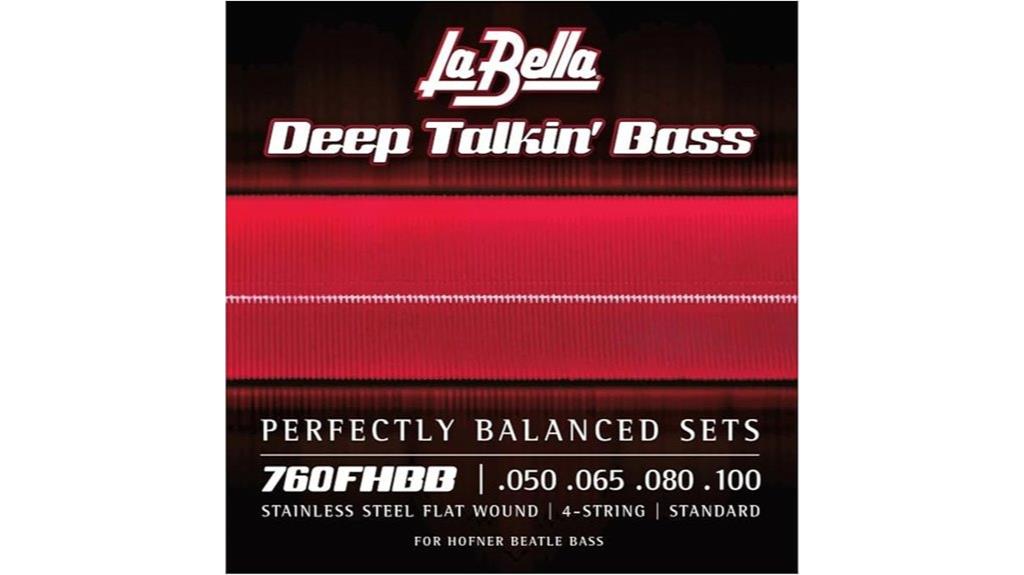
If you’re hunting for that authentic Beatles bass sound, the La Bella 760FHBB Deep Talkin Bass Guitar Strings deliver the exact tonal character that defined countless classic recordings. These handmade stainless steel flatwounds come specifically calibrated for Höfner “Beatle” basses, featuring gauges of .050, .065, .080, and .100 that perfectly complement the instrument’s unique bridge design. What sets these apart is their 34-inch ball-end to silk distance, making them incompatible with medium-scale basses but ideal for authentic Höfner models. Manufactured in the USA using premium American wire, they’re packaged with MAP Technology to prevent tarnishing and maintain freshness until installation.
Best For: Bass players seeking authentic Beatles-era tone from their Höfner “Beatle” bass guitars who want the deep, warm sound of professional flatwound strings.
Pros:
- Handmade in USA with premium American wire and specialized calibration for Höfner bridge types
- MAP Technology packaging prevents tarnishing and ensures maximum freshness until installation
- Delivers authentic Beatles bass tone that defined countless classic recordings
Cons:
- Only compatible with full-scale Höfner “Beatle” basses, not medium-scale instruments
- Flatwound design may feel unfamiliar to players accustomed to roundwound strings
- Limited to specific gauge set (.050-.100) with no alternative weight options
La Bella LTF-4A-M Low Tension Flats Electric Bass Strings (4-String Set)
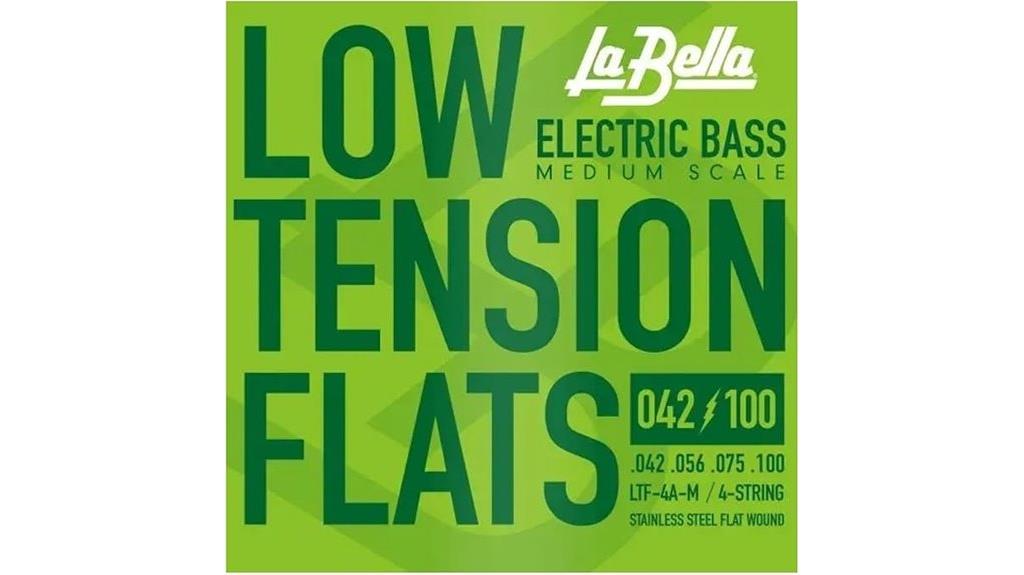
The La Bella LTF-4A-M Low Tension Flats represent a game-changer for bassists who’ve grown tired of fighting against high-tension flatwound strings that demand excessive finger strength and create unnecessary fatigue during extended playing sessions. These medium-scale stainless steel flatwounds feature round cores that deliver impressive flexibility, while the proprietary low-tension design maintains proper intonation without the dreaded floppy-string effect that plagues many lighter-gauge alternatives. You’ll appreciate the nylon coating’s smooth, slippery feel beneath your fingers, which reduces the pressure needed for clean fretting and enhances overall responsiveness during complex passages, making these strings particularly effective for jazz and funk applications where articulation matters most.
Best For: Bassists seeking comfortable, low-tension flatwound strings that deliver classic warm tone without finger fatigue, especially those playing jazz, funk, or extended sessions requiring smooth playability and responsive articulation.
Pros:
- Low tension design reduces finger fatigue while maintaining proper intonation without floppy-string effect
- Smooth nylon coating provides slippery feel that requires less fretting pressure and enhances responsiveness
- Pure, warm, deep sound quality with stainless steel construction that handles low tuning effectively
Cons:
- Medium gauge (.042-.100) still requires considerable finger strength despite being lower tension than traditional flats
- Limited aesthetic appeal with only silver color option available
- May require truss rod adjustments when switching from roundwound or traditional flatwound strings
La Bella 760FS-XL Deep Talkin’ Bass Guitar Strings (45-105)
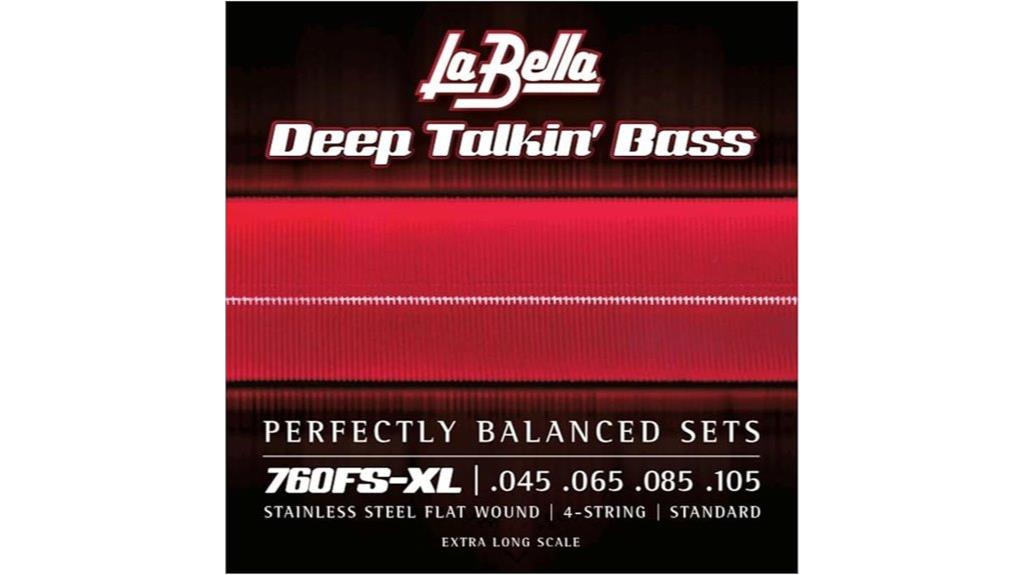
Veterans of the bass world have likely encountered La Bella’s legendary reputation, and the 760FS-XL Deep Talkin’ Bass Guitar Strings prove why this company has maintained its stranglehold on professional-grade flatwounds since the 1950s. These stainless steel rounds deliver the classic flatwound experience with gauges spanning .045 to .105, offering standard tension that balances playability with tonal depth. What sets these apart is their hand-polished finish and 38-inch length, though you’ll want to avoid them for through-body bass designs. The manufacturing quality shows in customer feedback, earning 4.6 stars across 34 reviews, with players consistently praising their comfort and sound quality improvements over stock strings.
Best For: Professional bass players and experienced musicians seeking the classic flatwound tone and feel that has been the industry standard since the 1950s.
Pros:
- Hand-polished stainless steel construction with superior manufacturing quality made in the USA
- Classic flatwound tone with comfortable playability and standard tension balance
- Strong customer satisfaction with 4.6/5 star rating and consistent praise for sound quality improvements
Cons:
- Not compatible with basses requiring through-body stringing due to design limitations
- Some customers report installation difficulties during setup
- Higher price point compared to standard roundwound bass strings
Ernie Ball Hybrid Slinky Flatwound Bass Guitar Strings (P02813)
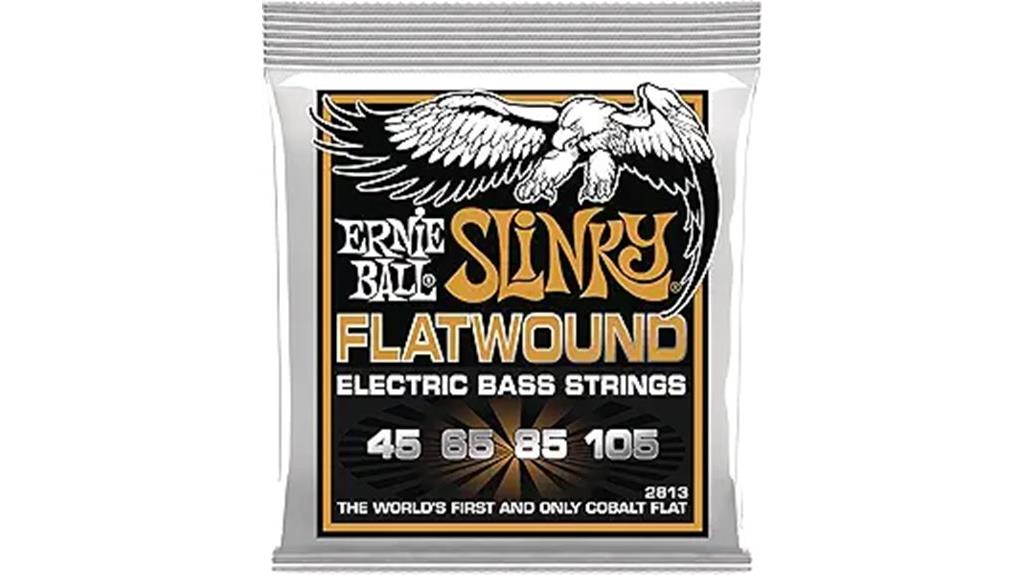
Modern bassists who crave the smooth playability of flatwound strings but refuse to sacrifice output and clarity will find their perfect match in Ernie Ball’s Hybrid Slinky Flatwound Bass Guitar Strings. These cobalt alloy strings deliver something I’ve rarely experienced: the traditional flatwound feel combined with roundwound-like harmonics and presence. The 45-105 gauge set offers comfortable tension that accommodates fingerstyle, slapping, and pick techniques equally well. You’ll appreciate how the cobalt wrap wire reduces finger noise while enhancing output, creating a lively warmth that responds beautifully to tone adjustments. Despite the premium price, these strings consistently deliver organic sound quality that works across pop, rock, and beyond.
Best For: Modern bassists who want the smooth feel of traditional flatwound strings without sacrificing the clarity, output, and harmonic richness typically found in roundwound strings.
Pros:
- Unique combination of flatwound smoothness with roundwound-like harmonics and presence thanks to cobalt alloy construction
- Versatile playability across multiple techniques including fingerstyle, slapping, and pick playing with comfortable 45-105 gauge tension
- Responsive to tone controls with reduced finger noise, offering wide tonal range from crisp presence to punchy bass
Cons:
- Premium pricing compared to standard flatwound alternatives may not fit all budgets
- Some users report initial oiliness requiring fingerboard cleaning after installation
- May not satisfy players seeking the traditional muted flatwound sound due to its lively, modern character
DAddario XL Chromes Flat Wound Bass Guitar Strings (ECB81)
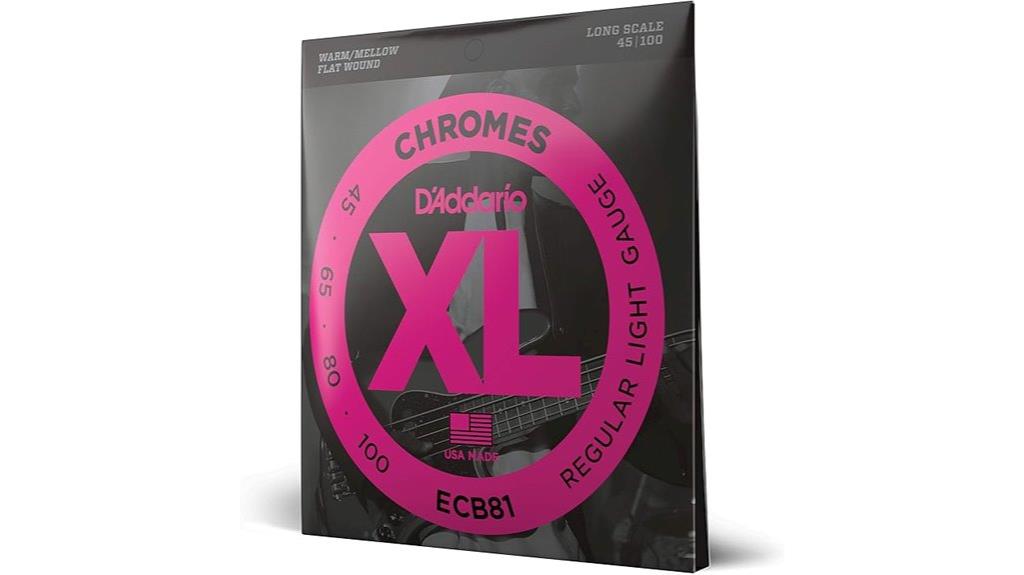
Jazz bassists seeking that quintessential smooth, warm tone will find their perfect match in D’Addario’s XL Chromes ECB81 flatwound strings, which deliver the mellow character that’s made them a studio standard for decades. These strings feature a high carbon steel core wrapped with polished stainless steel ribbon wire, creating that signature dark, rich sound you’ll hear on countless R&B and pop recordings. The proprietary hex-core design guarantees perfect intonation across the fretboard, while the flattened construction virtually eliminates finger noise during slides and position changes. At 45-100 gauge, they’re comfortable for both fingerstyle and pick playing, offering excellent string-to-string balance that translates beautifully whether you’re walking through jazz changes or laying down groove-heavy basslines.
Best For: Jazz, R&B, and pop bassists who want smooth, warm tones with minimal finger noise for both fingerstyle and pick playing techniques.
Pros:
- Delivers exceptional warm, mellow tone with rich low-end that’s perfect for jazz and R&B styles
- Virtually eliminates finger noise during slides and position changes due to flat wound construction
- Features proprietary hex-core design that ensures perfect intonation and excellent durability
Cons:
- May lack the brightness and attack that some rock or metal players prefer
- Flat wound strings typically have less sustain compared to round wound alternatives
- Higher price point than standard round wound bass strings
La Bella 760FS Deep Talkin Bass Guitar Strings (45-105)
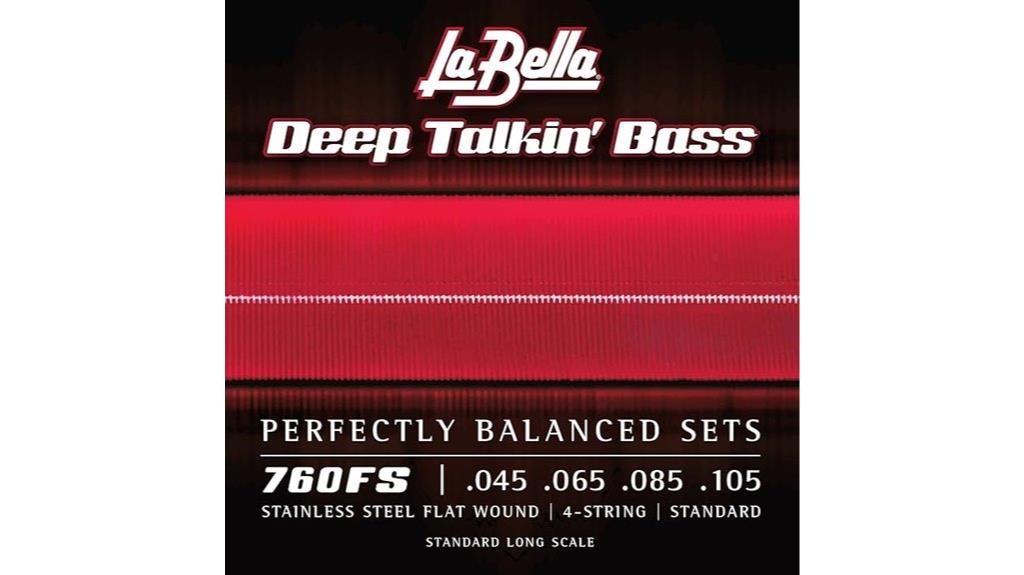
Since the 1950s and 60s, professional bass players have consistently turned to La Bella’s 760FS Deep Talkin’ strings, and I can understand why these stainless steel flatwounds have earned their reputation as the gold standard in the industry. These hand-polished strings deliver excellent quality and performance, featuring standard long scale gauges of .045, .065, .085, and .105 that provide balanced tension across your fretboard. The American-made construction uses domestic wire and MAP technology packaging, which prevents tarnishing while ensuring freshness until you’re ready to install them on your bass.
Best For: Professional bass players and serious musicians seeking the industry-standard flatwound sound with smooth feel and excellent build quality.
Pros:
- Hand-polished stainless steel construction delivers smooth feel and professional tone quality
- Industry standard since the 1950s-60s with proven track record among professional bassists
- Made in USA with MAP packaging technology that prevents tarnishing and ensures string freshness
Cons:
- Standard tension may not suit all playing styles or bass setups
- Not compatible with body-through bridge designs
- Requires careful installation with only silk portion wrapping around tuning posts to prevent breakage
Fender 9050 Bass Strings, Stainless Steel Flatwound, 9050M .055-.105
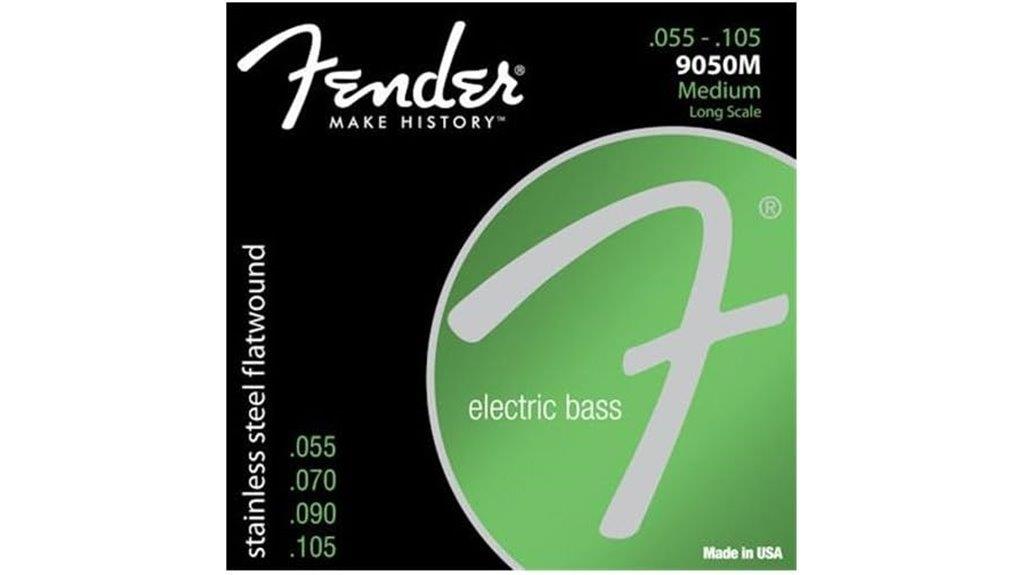
Fender’s 9050 stainless steel flatwound strings deliver that classic warm, mellow tone that jazz purists, reggae enthusiasts, and vintage sound seekers have chased for decades, wrapping your bass in the buttery-smooth playability that made legends like James Jamerson and countless Motown session players sound so effortlessly groovy. These .055-.105 gauge strings feature silk wraps at tuning posts that protect windings, while their stainless steel construction provides enhanced tuning stability and impressive longevity. You’ll appreciate how they minimize finger noise during slides, making them particularly excellent for fretless applications where every subtle movement gets amplified through your amp.
Best For: Jazz musicians, reggae players, fretless bass enthusiasts, and vintage tone seekers who want warm, mellow sound with reduced finger noise and smooth playability.
Pros:
- Delivers classic warm, mellow tone ideal for jazz, reggae, and vintage styles with significantly reduced finger noise
- Features silk wraps at tuning posts and stainless steel construction for enhanced tuning stability and impressive longevity
- Offers buttery-smooth playability that’s particularly excellent for fretless basses and sliding techniques
Cons:
- May require action height adjustment for optimal performance on some bass setups
- Some users report compatibility challenges with specific bass designs
- Flatwound design may not suit players seeking the bright, punchy tone of roundwound strings
Ernie Ball Group III Flatwound Bass Guitar Strings, 45-100 Gauge (P02806)
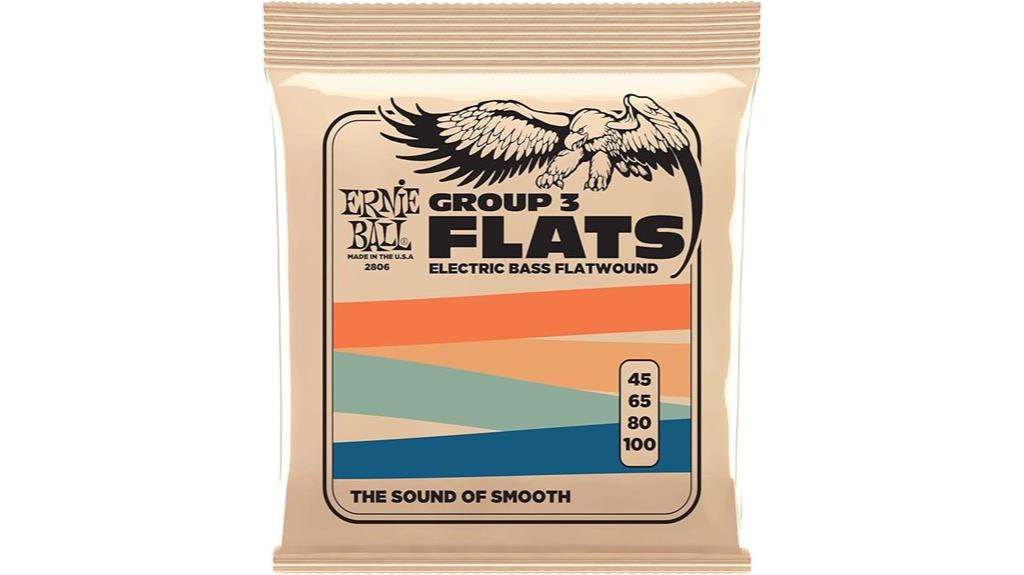
The Ernie Ball Group III Flatwound Bass Guitar Strings stand out as the go-to choice for bassists who crave that vintage warmth without sacrificing modern playability, thanks to their flattened stainless steel wrap wire over a hex-shaped tin-plated steel core that delivers both durability and tonal richness. You’ll notice the 45-100 gauge configuration provides that sweet spot between comfortable fretting and substantial low-end presence, though you might find yourself working slightly harder during aggressive playing due to the increased tension. The smooth surface dramatically reduces finger noise while delivering that broken-in warmth straight from the package, making these strings particularly valuable for recording sessions where every squeak matters.
Best For: Bassists seeking vintage warmth and reduced finger noise for recording or live performance, particularly those who prioritize smooth playability and rich tonal character over bright, modern sounds.
Pros:
- Flattened stainless steel construction eliminates finger noise while delivering warm, broken-in tone straight from the package
- Excellent durability with hex-shaped tin-plated steel core providing long-lasting performance and tuning stability
- Versatile across multiple genres with smooth feel that enhances playing comfort for both beginners and experienced players
Cons:
- Higher tension requires more effort during aggressive playing and plucking compared to roundwound strings
- Some quality control issues reported including strings breaking during tuning or length compatibility problems with certain bass setups
- May require action adjustments on specific basses due to rattling or compatibility issues with existing hardware
D’Addario Bass Guitar Strings, XL Nickel Half Rounds (ENR71)
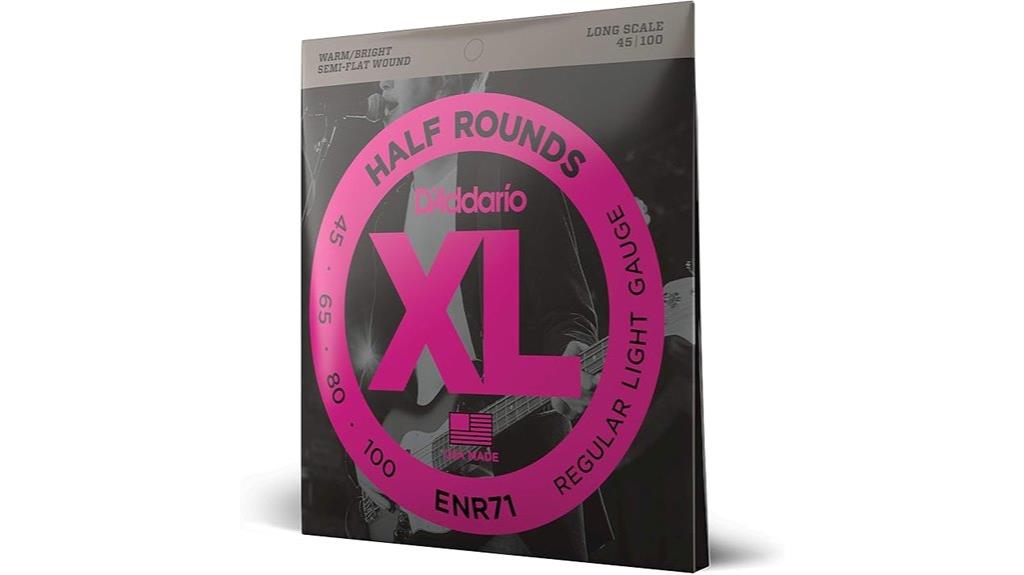
D’Addario’s XL Nickel Half Rounds (ENR71) represent what I’d call the perfect compromise for bassists who can’t decide between the brightness of roundwound strings and the muted warmth of traditional flatwounds. These precision-ground strings reduce finger noise while maintaining round wound brightness, thanks to D’Addario’s proprietary heat treating process and high carbon steel hex-core construction. You’ll appreciate their versatility across jazz, rock, and metal genres, with the 45-100 gauge providing smooth playability on long scale basses. While they’re technically half rounds rather than true flatwounds, they deliver that coveted fretless bass tone quality many players seek.
Best For: Bassists seeking a balanced tone between roundwound brightness and flatwound warmth, particularly those who play across multiple genres like jazz, rock, and metal while wanting reduced finger noise.
Pros:
- Unique precision-ground surface reduces finger noise while maintaining roundwound brightness and sustain
- Versatile tone quality that works well across multiple musical genres from jazz to metal
- High-quality construction with high carbon steel hex-core and proprietary heat treating for durability and consistency
Cons:
- Slight increase in string tension may require amplifier or pedal adjustments
- Not true flatwounds, so may not satisfy players specifically seeking authentic flatwound characteristics
- Higher price point compared to standard roundwound strings
Factors to Consider When Choosing Flatwound Bass Strings
When I’m helping bassists choose flatwound strings, I’ve learned that several critical factors determine whether you’ll love or hate your selection, and getting these wrong can leave you with expensive strings that fight against your playing style. The five key considerations I always discuss—string gauge selection, scale length compatibility, material and construction quality, tension preferences, and tonal characteristics—work together like puzzle pieces, where each choice influences the others in ways that aren’t immediately obvious to many players. I’ve seen too many bassists focus solely on brand reputation or price while ignoring these fundamental compatibility factors, which inevitably leads to disappointment and wasted money.
String Gauge Selection
Although choosing the right string gauge might seem straightforward, I’ve found that this decision greatly impacts both your playing experience and the overall sound you’ll achieve with flatwound bass strings. Common flatwound sets typically feature gauges like .045, .065, .085, and .105, though you’ll find options ranging from .040 to .110. I’ve noticed that heavier gauges above .100 deliver richer, deeper tones but demand more finger strength, which can challenge some players. Conversely, lighter gauges around .040 to .045 offer easier playability and quicker response, perfect for intricate fingework. The tension factor matters too—lower tension strings feel more comfortable but may sacrifice some tonal volume. Your playing style and bass setup ultimately determine the ideal gauge choice.
Scale Length Compatibility
Before diving into specific string brands, I’ve learned that matching your bass’s scale length with the correct flatwound strings prevents frustrating setup issues and guarantees peak performance. Long scale basses, measuring up to 36¼ inches, require strings with specific ball-end to silk distances—typically 38 inches for G, D, and A strings, while the E string measures 36¾ inches. Medium scale instruments, around 32 inches, need correspondingly shorter strings to avoid excess wrapping around tuning pegs, which I’ve found creates tuning instability and premature wear. Some flatwound sets are designed exclusively for through-body stringing, making them incompatible with certain bridge types. I always verify these specifications before purchasing, since mismatched scale lengths can result in inadequate tension, poor intonation, and compromised tone quality that defeats the purpose of upgrading to flatwounds.
Material and Construction
Once you’ve confirmed your bass’s scale length requirements, the core construction and winding materials become the primary determinants of your flatwound strings‘ performance characteristics, longevity, and tonal output. I’ve found that stainless steel and metal alloy constructions deliver exceptional durability while providing that characteristic smooth surface that eliminates finger noise during intricate passages. The flat winding technique, which wraps material horizontally around the core rather than spirally, creates those warm, mellow tones that make flatwounds so appealing for jazz and vintage rock applications. Most quality manufacturers incorporate hex cores that markedly improve intonation stability and extend string life. Additionally, hand-polished finishes enhance both tactile comfort and tonal clarity, making these strings worth their premium pricing for serious players.
Tension Preferences
When selecting flatwound bass strings, tension preferences fundamentally shape your playing experience, affecting everything from finger comfort during marathon sessions to the punch and clarity of your bass’s output through your amplifier. I’ve discovered that low tension strings, typically gauged around .042-.100, offer exceptional flexibility that reduces finger fatigue during extended performances, making them ideal for gigging bassists who value comfort over everything else. Standard tension options, like .045-.105 sets, provide balanced response across various playing styles while maintaining solid tonal integrity. High tension strings deliver enhanced sustain and pronounced clarity, though they demand more finger strength and aren’t for everyone. Your personal comfort level and desired sound should guide this decision, as tension greatly impacts both performance quality and overall playing satisfaction.
Tonal Characteristics
Understanding flatwound strings’ tonal characteristics requires appreciating their fundamentally different sound philosophy compared to their roundwound counterparts, as these smooth-wrapped strings deliver a distinctly warm, focused tone that’s become synonymous with professional jazz, R&B, and classic rock recordings. I’ve found that flatwounds’ stainless steel ribbon construction creates a mellower, more rounded sonic profile with enhanced low-end richness and reduced upper harmonics. The high carbon steel core paired with polished wrapping produces that darker, warmer character I’m after when recording or performing live. What consistently impresses me is how flatwounds maintain excellent sustain while eliminating the finger noise that can plague studio sessions, making them invaluable for genres requiring clean, articulate bass lines.
Playing Style Considerations
Three fundamental playing techniques determine whether flatwound strings will enhance or hinder your bass performance, and I’ve learned through years of experimentation that understanding these compatibility factors saves both time and money when selecting the right set.
Fingerstyle players consistently benefit from flatwounds’ smooth surface texture, which reduces finger noise while delivering the warm, mellow tones essential for jazz, R&B, and classic rock applications. However, I’ve noticed that aggressive slap and pop techniques suffer with flatwounds, as they lack the bright attack and percussive response that roundwounds provide.
Lower-tension flatwound sets considerably improve playability comfort during extended sessions, though you’ll likely need truss rod and action adjustments when moving from roundwounds to accommodate their unique feel and tension characteristics.
Bridge Design Requirements
Since your bass bridge directly influences string compatibility, I’ve discovered that overlooking this critical factor often leads to frustrating installation problems, poor intonation, and wasted money on incompatible string sets. Top-load bridges often struggle with flatwounds, requiring through-body stringing for proper string seating and tension distribution. I always measure the ball-end to silk distance carefully, as flatwounds vary greatly between manufacturers, affecting how they align with individual saddles or lift mechanisms.
Standard scale flatwounds won’t fit medium or short-scale basses unless explicitly designed for them, something I learned the hard way. Bridge designs with adjustable saddles require specific gauges to maintain proper intonation, while the increased tension of flatwounds can stress poorly designed hardware, making careful selection essential for ideal performance.
Budget and Longevity
While flatwound strings demand a higher upfront investment than their roundwound counterparts, I’ve found that their exceptional longevity makes them surprisingly economical for most players who stick with them long-term. The smoother surface construction means less finger friction and wear, which translates to strings that maintain their tonal characteristics months longer than roundwounds. I’ll admit that sticker shock hits when you’re comparing prices initially, but the math works out favorably over time. High-quality flatwounds can last six months to a year with regular playing, while roundwounds typically need replacement every two to three months. Budget-conscious players should resist the temptation of cheap alternatives that wear out quickly, ultimately costing more through frequent replacements.
On a final note
I’ve tested countless flatwound sets over the years, and these eight options consistently deliver the smooth tone and effortless playability that makes flatwounds so appealing. Whether you’re chasing that vintage thump, need reduced finger noise for studio work, or simply prefer the silky feel under your fingers, there’s a set here that’ll match your playing style and musical needs perfectly.

